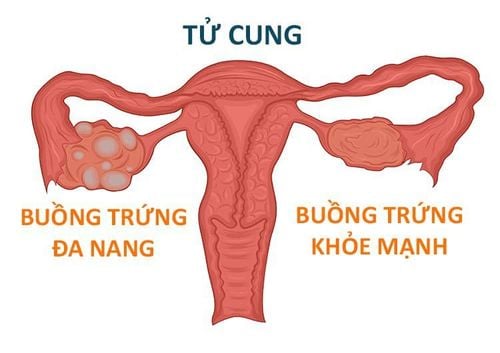This is an automatically translated article.
Polycystic ovary syndrome (PCOS) has been linked to an increased risk of diabetes by numerous studies. Therefore, people with PCOS need to adopt healthy eating and living habits to limit the risk of disease.
1. What is polycystic ovary syndrome?
Polycystic ovary syndrome is proven by many experts to be related to diabetes.
Polycystic ovary is a disease caused by the male hormone androgen. The cause of polycystic ovaries is thought to be insulin resistance, which prevents them from being used effectively, builds up in the blood, and stimulates androgen production. In addition, inflammation and genetic factors can also cause PCOS.
It is estimated that the prevalence of polycystic ovary syndrome varies widely from country to country. Reports indicate that the condition affects 2.2 to 26% of women worldwide.

Buồng trứng đa nang có liên quan đến bệnh tiểu đường
2. What are the symptoms of PCOS?
Polycystic ovary syndrome has the following symptoms:
Irregular menstruation Excessively long hair Acne growth Slowly gaining weight, obesity Polycystic ovary also affects a woman's fertility (infertility) female. The disease is usually diagnosed after finding multiple follicles in a woman's ovaries on ultrasound.
3. How are polycystic ovaries related to diabetes?
Insulin resistance in polycystic ovary disease is thought to be the cause of type 2 diabetes. It is a condition in which the insulin produced is not used effectively, leading to an excess in the blood.
Several studies have shown that PCOS can independently increase the risk of diabetes, despite prevention and control of the risk through exercise and diet. Eating.
In fact, women who develop PCOS at a young age have an increased risk of diabetes and heart problems in later life.

Phụ nữ bị buồng trứng đa nang có nguy cơ mắc tiểu đường cao hơn khi về già
4. Studies show a link between polycystic ovaries and diabetes
Studies of more than 8,000 women in Australia have found that those with polycystic ovary syndrome are 4- to 8.8 times more likely to develop type 2 diabetes than women without PCOS.
A 2017 study in Danish women found that those with PCOS were four times more likely to develop type 2 diabetes than the general population. Women with PCOS also tended to be diagnosed with diabetes 4 years earlier than women without PCOS.
According to Australian research, pregnant women with PCOS are almost 3 times more likely to develop gestational diabetes than women without gestational diabetes. Many studies have shown that not only is it associated with type 2 diabetes, polycystic ovaries are also expressed in women with type 1 diabetes.
Based on medical evidence, experts recommend that women with PCOS get regular checkups to reduce their risk of diabetes.
5. How to reduce the risk of diabetes for people with polycystic syndrome?
Exercise Exercise has been shown to reduce the risk of diabetes in women with PCOS. When exercising, the body will burn excess sugar in the blood, helping to increase the sensitivity of cells to insulin, and lose weight. These benefits are especially significant for people at risk for diabetes.

Tập thể dục giúp tăng cường sức khỏe và đẩy lùi nguy cơ mắc bệnh tiểu đường
Proper diet A balanced diet is also key to reducing diabetes risk and weight control in women with PCOS. In your daily meal, you need to include the following nutrients: whole grains, lean protein, healthy fats, fruits and vegetables.
Use of drugs Women with polycystic ovaries are treated with oral contraceptives . This is a medication that helps regulate menstruation and in some cases clear up acne. Because some oral contraceptives raise blood sugar, to treat insulin resistance in PCOS, patients are often prescribed the drug metformin (Glucophage, Glumetza).
Polycystic ovary disease not only causes weight gain, affects fertility, but also increases the risk of diabetes, gestational diabetes. Therefore, to ensure health as well as avoid complications caused by polycystic ovary syndrome, women should go for regular gynecological health check-ups at trusted specialized medical facilities to early detection and appropriate treatment.
Vinmec International General Hospital is a prestigious gynecological treatment address with modern equipment and a team of highly skilled and professional doctors. Currently, Vinmec has a basic Gynecological Examination and Screening Package, helping customers to detect gynecological diseases early, including polycystic ovary disease. From there, doctors will give advice to limit the risk of complications of the disease and treatment regimens to ensure health and fertility for customers in the future.
To register for examination and treatment at Vinmec International General Hospital, you can contact Vinmec Health System nationwide, or register online HERE
Reference: diabetes.co.uk , healthline.com, cdc.gov













